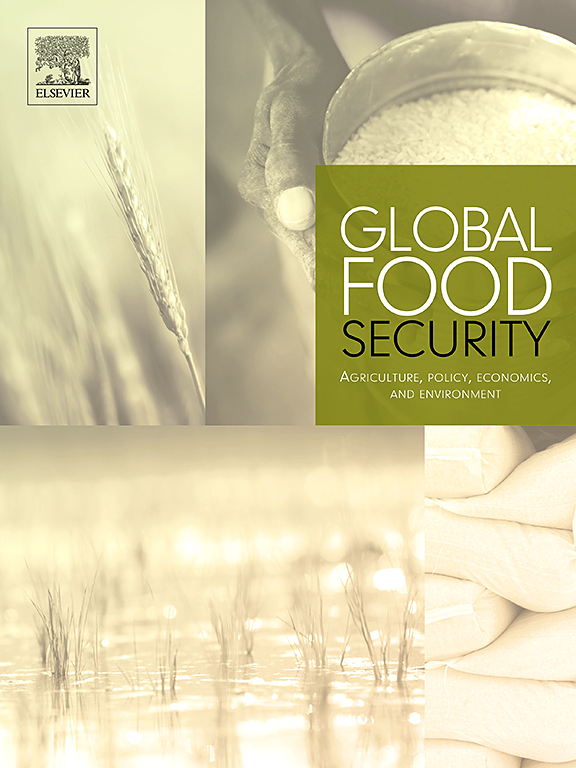Capital constraints or biased norms? Tracing the root of gendered agricultural productivity in rural China
IF 9.6
1区 经济学
Q1 FOOD SCIENCE & TECHNOLOGY
Global Food Security-Agriculture Policy Economics and Environment
Pub Date : 2025-06-01
DOI:10.1016/j.gfs.2025.100865
引用次数: 0
Abstract
Notwithstanding the voluminous localized evidence of great gender divergence in agricultural productivity, the intricacies and interactions in underlying mechanisms—from comparative advantage at capitals and capabilities to biased social norms and institutions—lack a systematic quantification. This study applies a gender-inclusive livelihood framework, integrating feminist economics and simultaneous equation systems, to unveil the root causes and the role of gender norms in perpetuating agricultural inequality. Drawn on 12795 rural households in China from 2015 to 2019, our findings dismantle a resource-contingent decision-making process, interacted with local institutions, in constituting 7–13 % gender-productivity gaps. Earlier-born cohorts suffer concentrated yield gaps reaching 23 %. While limited access to fundamental resources and economic opportunities for rural women explains 62–82 % of the path-based mechanism, pervasive inequalities in human capital and access to crop marketing channels emerge as predominant contributors, stressing long-standing gaps in knowledge and motivation. Local gender-biased norms further exacerbate gender-productivity gaps by undermining returns to women's endowments, and an intra-household old-age caring penalty disproportionately restricts their market participation. We conclude with lessons for optimizing gender-transformative intervention frameworks.
资本约束还是有偏见的规范?中国农村农业生产力性别化的根源探析
尽管有大量的地方性证据表明农业生产率存在巨大的性别差异,但潜在机制的复杂性和相互作用——从资本和能力的比较优势到有偏见的社会规范和制度——缺乏系统的量化。本研究采用性别包容的生计框架,结合女权主义经济学和联立方程系统,揭示了性别规范在农业不平等持续存在中的根本原因和作用。基于2015年至2019年中国12795户农村家庭的数据,我们的研究结果消除了与当地机构互动的资源决定决策过程,造成了7-13 %的性别生产力差距。较早出生的人群遭受集中的产量差距,达到23% %。虽然农村妇女获得基本资源和经济机会的机会有限解释了62% - 82% %的路径机制,但人力资本和作物销售渠道获取方面普遍存在的不平等是主要原因,强调了长期存在的知识和动机差距。当地的性别偏见规范削弱了妇女捐赠的回报,进一步加剧了性别生产率差距,而家庭内部的养老惩罚不成比例地限制了她们的市场参与。我们总结了优化性别变革干预框架的经验教训。
本文章由计算机程序翻译,如有差异,请以英文原文为准。
求助全文
约1分钟内获得全文
求助全文
来源期刊

Global Food Security-Agriculture Policy Economics and Environment
FOOD SCIENCE & TECHNOLOGY-
CiteScore
20.90
自引率
3.40%
发文量
69
期刊介绍:
Global Food Security plays a vital role in addressing food security challenges from local to global levels. To secure food systems, it emphasizes multifaceted actions considering technological, biophysical, institutional, economic, social, and political factors. The goal is to foster food systems that meet nutritional needs, preserve the environment, support livelihoods, tackle climate change, and diminish inequalities. This journal serves as a platform for researchers, policymakers, and practitioners to access and engage with recent, diverse research and perspectives on achieving sustainable food security globally. It aspires to be an internationally recognized resource presenting cutting-edge insights in an accessible manner to a broad audience.
 求助内容:
求助内容: 应助结果提醒方式:
应助结果提醒方式:


